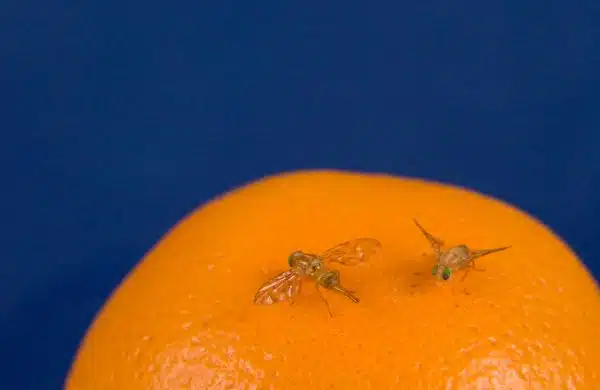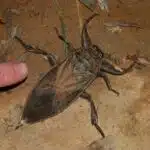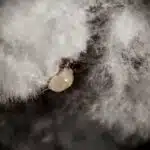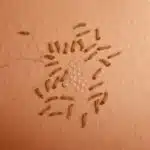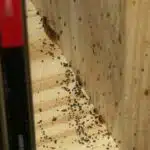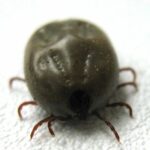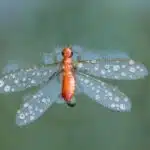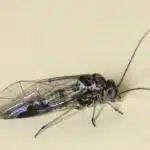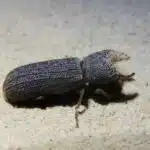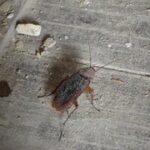Fruit flies are a common household pest that can be quite frustrating to deal with. These tiny insects, also known as vinegar flies, can infest your kitchen and contaminate your food. They are attracted to ripe or decaying fruits and vegetables, as well as sugary substances such as juices and alcohol. Fruit fly populations can quickly spiral out of control if left unchecked, making it important to take preventative measures.
As an entomologist/pest control specialist, I have observed that fruit flies can pose health risks by spreading bacteria and other pathogens. Therefore, it is essential to learn how to prevent fruit fly infestations in your home. In this article, we will discuss effective methods for preventing fruit flies from invading your kitchen and ruining your food supplies. By implementing these strategies, you can protect yourself and your family from the annoyance and potential health hazards associated with these pesky insects.
Understanding The Lifecycle Of Fruit Flies
As a pest control specialist, it is always fascinating to study the lifecycle of fruit flies. These tiny insects may seem harmless, but they can quickly become a nuisance if left unchecked. To prevent fruit fly infestations, it is essential to understand their anatomy and life cycle stages.
Fruit flies are part of the Drosophilidae family and are commonly found in warm and humid environments. Their bodies are small, usually measuring around 3mm in length with distinctive red eyes. Interestingly, only female fruit flies lay eggs on ripe or decaying fruits and vegetables – this is where the larvae will feed and develop until they reach adulthood.
The lifespan of a fruit fly can vary depending on different factors such as temperature and humidity. On average, fruit flies can live up to 50 days in ideal conditions. The entire lifecycle from egg to adult takes approximately eight days, during which the eggs hatch into larvae before pupating into an adult fly. Understanding these different stages of development is crucial for identifying potential breeding sites and taking preventative measures to stop further breeding.
Identifying Potential Breeding Sites
Fruit flies are notorious for their ability to breed and multiply rapidly in the right environment. As an entomologist or pest control specialist, it is important to identify potential breeding sites to prevent fruit fly infestations. Common breeding sites include:
- Overripe or rotting fruits and vegetables
- Fermenting beverages such as beer and wine
- Damp areas like kitchen sinks and drains
Prevention strategies should be implemented to reduce the likelihood of fruit fly infestations. These strategies include:
- Properly disposing of overripe or rotting fruits and vegetables in sealed containers
- Regularly cleaning kitchen sinks and drains with a mixture of vinegar and baking soda to eliminate any organic buildup that may attract fruit flies
- Keeping fermenting beverages covered tightly with lids or stored in the refrigerator
By identifying potential breeding sites and implementing prevention strategies, homeowners can significantly reduce the chances of a fruit fly infestation in their home. In addition to these strategies, proper food storage techniques can also help prevent fruit flies from multiplying.
Transition: Now that we have discussed common breeding sites and prevention strategies, let’s move on to exploring proper food storage techniques that can help keep fruit flies at bay.
Proper Food Storage Techniques
Proper food storage techniques are essential in preventing fruit flies from infesting your kitchen. One of the best ways to avoid fruit flies is through organization. Ensure that your pantry, cupboards, and refrigerator are clean and free of any spills or crumbs. Keep your fruits and vegetables separate from each other to prevent cross-contamination.
Using containers is another effective way to store your food properly. Opt for airtight containers to prevent any access points for fruit flies. If you have leftover fruits, consider putting them in the refrigerator instead of leaving them on the counter. By doing this, you can extend their shelf life while also minimizing the risk of attracting fruit flies.
Timing and location are also critical factors when it comes to preventing fruit flies. Dispose of any overripe fruits immediately as they will attract fruit flies quickly. Keep your garbage cans closed and away from any food sources. When storing your fresh produce, make sure that it is not kept in a warm or humid location, as this can accelerate decay and attract pests.
Effective food storage techniques play a crucial role in preventing fruit fly infestations in your home. However, proper storage alone may not be enough to keep these pesky insects at bay. In addition to organizing and using containers, regular cleaning and sanitation practices must also be implemented to ensure that your kitchen remains pest-free.
Regular Cleaning And Sanitation
- Disposing of garbage regularly is essential to prevent fruit flies as it eliminates their food source.
- Proper food storage, such as refrigerating, sealing, and disposing of food items, also reduces the chances of a fruit fly infestation.
- It is important to regularly clean and disinfect surfaces, such as countertops and kitchen sinks, to reduce the chance of a fruit fly infestation.
- Regularly emptying and cleaning out garbage cans and other containers where food waste is stored is also key to controlling a fruit fly infestation.
- Areas where food is prepared should be kept clean and free of food residues to reduce the potential for a fruit fly infestation.
- Routinely inspecting and cleaning food storage areas, such as pantries and refrigerators, can help to prevent fruit fly infestations.
Regular Garbage Removal
Fruit flies are a common household pest that can be a nuisance to deal with. One effective way to prevent fruit flies from infesting your home is by regularly removing garbage. As an entomologist/pest control specialist, I understand the importance of proper waste disposal in preventing fruit fly infestations.
Composting techniques may seem like a great way to dispose of food waste, but it can also attract fruit flies. If you do choose to compost, make sure to use a sealed container and avoid adding any meat or dairy products. It is essential to empty the compost bin regularly and ensure that it is properly sealed.
Effective waste disposal is crucial in preventing fruit fly infestations. Make sure to dispose of any food waste promptly and securely. Avoid leaving any food scraps in open containers or on countertops. Regularly clean your garbage cans with soap and water, and make sure they are tightly closed to prevent fruit flies from entering.
In conclusion, regular garbage removal is one of the most effective ways to prevent fruit fly infestations in your home. As an entomologist/pest control specialist, I recommend using proper composting techniques and effective waste disposal methods for optimal results. By following these simple steps, you can keep your home free from pesky fruit flies and maintain a clean and healthy living environment for you and your family.
Proper Food Storage
Regular cleaning and sanitation is crucial in preventing fruit fly infestations, but it is not the only factor that contributes to a pest-free home. Proper food storage is also essential in keeping fruit flies away. As an entomologist/pest control specialist, I have seen firsthand how disorganized pantries and improper food storage can attract fruit flies. Fortunately, there are several food storage hacks that you can use to keep your pantry organized and free from pests.
One effective way to prevent fruit flies from infesting your pantry is by organizing it properly. Make sure to store all your dry goods, such as flour, rice, and pasta, in airtight containers with secure lids. This will prevent fruit flies from laying their eggs on these items and contaminating them. It is also essential to keep your pantry clean and free from crumbs or spills that could attract fruit flies.
Another important tip for proper food storage is to refrigerate or freeze perishable items promptly. Fruits and vegetables should be stored in the refrigerator or freezer if you do not plan to consume them within a few days. This will prevent them from rotting and attracting fruit flies. It is also a good idea to store any opened jars of condiments or sauces in the refrigerator, as they can spoil quickly at room temperature.
In conclusion, regular cleaning and sanitation are necessary for keeping your home free from pests like fruit flies, but proper food storage cannot be overlooked. By organizing your pantry and storing perishable items correctly, you can prevent fruit fly infestations before they even start. These simple steps will not only help you maintain a clean and healthy living environment but also save you money by reducing food waste due to contamination or spoilage.
Cleaning Surfaces
As an entomologist/pest control specialist, I emphasize the importance of regular cleaning and sanitation in preventing pest infestations. Fruit flies are attracted to moist areas and organic matter, making them a common nuisance in homes that are not kept clean. To ensure a pest-free environment, it is essential to clean surfaces regularly using appropriate disinfectants or natural cleaning methods.
Surface disinfectants like bleach or hydrogen peroxide can effectively kill bacteria and viruses on surfaces, including those that attract fruit flies. However, it is crucial to follow instructions carefully when using these chemicals to avoid any adverse effects on human health or the environment. Alternatively, natural cleaning methods like vinegar or lemon juice can also be used to sanitize surfaces while being environmentally friendly.
In addition to using surface disinfectants or natural cleaning methods, it is important to focus on high-touch areas such as countertops, doorknobs, and light switches. These areas are frequently touched by multiple people and can quickly become contaminated with bacteria and viruses. By prioritizing these surfaces during regular cleaning routines, you can minimize the risk of fruit fly infestations in your home.
Using Fly Traps And Baits
As the fruit fly population expands, it may be necessary to use traps and baits to control their numbers. One effective option is a DIY fly trap, which can be made using common household items. To create a simple trap, cut off the top of a plastic bottle and invert it into the bottom half. Fill the bottom with a sweet bait such as apple cider vinegar or overripe fruit mixed with sugar water. The flies will enter through the opening at the top and become trapped in the liquid below.
For those looking for homemade bait recipes, there are several options that can be effective in trapping fruit flies. A mixture of apple cider vinegar and dish soap has been proven to attract and kill these pests. Another recipe involves mashing up overripe fruit and adding sugar water to create a sweet solution that will draw in the flies. It is important to replace the bait regularly to ensure its effectiveness.
Using traps and baits can significantly reduce the number of fruit flies in an area, but it is not always enough on its own. Combining these methods with natural repellents or essential oils can provide even greater control over these pesky insects. In the following section, we will explore some of these options and how they work to keep fruit flies at bay.
Natural Repellents And Essential Oils
Using fly traps and baits is an effective method to combat fruit flies, but it’s not the only option. Natural repellents and essential oils can also be used to prevent the infestation of fruit flies. These methods are preferred by many individuals as they are eco-friendly, inexpensive, and easy to prepare using DIY recipes.
One popular natural repellent is apple cider vinegar mixed with dish soap. The vinegar attracts the fruit flies, while the dish soap breaks down their waxy outer layer causing them to drown. Another effective essential oil is peppermint oil; its strong scent acts as a deterrent for fruit flies. Lastly, placing cloves on citrus fruits or in areas where fruit flies are prevalent can also deter them.
When comparing the effectiveness of these natural methods with traditional traps and baits, it’s important to note that they may not work as quickly or effectively as chemical-based products. However, they are still a great alternative for those who prefer natural solutions or want to avoid harsh chemicals in their homes.
Incorporating natural repellents into your strategy for preventing fruit flies can be a great addition to traditional methods such as fly traps and baits. The next section will discuss another effective way to prevent these pests: screening windows and doors.
Screening Windows And Doors
Effective prevention of fruit flies requires a multi-faceted approach. One important aspect is proper screening of windows and doors. This will prevent these pests from entering the home and laying eggs on ripe or fermenting fruits.
When it comes to selecting screens, there are several types available. The most common is fiberglass mesh, which is affordable and easy to install. Aluminum screens are more durable and long-lasting but may be costlier. For those who prefer an eco-friendly option, there are screens made of bamboo or recycled plastic.
DIY screen installation can save money and provide a sense of accomplishment; however, it requires careful attention to detail. Ensure that the frames are properly fitted and sealed to avoid gaps where fruit flies can enter. Additionally, inspect the screens regularly for tears or holes that could compromise their effectiveness.
To effectively prevent fruit flies from entering the home through windows and doors, homeowners must choose appropriate screens and install them correctly. However, this step alone may not be sufficient in keeping fruit flies at bay. Another crucial measure involves keeping trash bins sealed tightly to avoid attracting these pesky insects.
Keeping Trash Bins Sealed
Trash bins are the favorite breeding ground for fruit flies. The sight of trash cans filled with food remnants can be a welcoming invitation to these pesky insects. As entomologists and pest control specialists, we recommend that trash bin maintenance should be given utmost priority in order to prevent fruit flies from infesting your surroundings.
Proper disposal practices are key when it comes to preventing fruit fly infestation. Make sure all food scraps and waste are disposed of properly, and not left exposed in open trash cans. Trash should be taken out regularly, especially during warmer seasons when flies tend to breed more actively. Additionally, ensure that your trash cans have tightly sealed lids and no holes or leaks where fruit flies could enter.
Regular cleaning of your trash cans is also essential in preventing fruit fly infestations. Wipe down the lids and sides of your garbage bins with a disinfectant cleaner on a weekly basis to get rid of any remaining organic matter that could attract these pests. Remember, proper sanitation is crucial when it comes to keeping away unwanted insects from your home or business premises. In our next section, we will discuss how minimizing moisture and humidity can help prevent fruit fly infestations.
Minimizing Moisture And Humidity
To prevent fruit flies, it is important to take a holistic approach by considering all possible sources of attraction for these pests. In addition to keeping trash bins sealed, minimizing moisture and humidity levels in the surrounding environment is another effective strategy that can be employed.
Dehumidifying techniques can help reduce the presence of fruit flies by creating an inhospitable environment for their breeding and growth. This can be achieved by using dehumidifiers or air conditioners to lower humidity levels indoors. Additionally, ensuring proper ventilation in areas such as kitchens, bathrooms and laundry rooms can also help reduce moisture accumulation and prevent fruit fly infestations from developing.
Moisture control strategies are also crucial in preventing fruit fly infestations. This includes fixing any water leaks or drips around the house, wiping down wet surfaces regularly, and avoiding overwatering indoor plants. By adopting these practices, homeowners can significantly reduce the likelihood of attracting fruit flies into their homes.
Next, we will discuss maintaining your garden and compost pile as an additional step towards preventing fruit fly infestations.
Maintaining Your Garden And Compost Pile
Composting basics are an essential part of maintaining a garden. While composting provides numerous benefits, it can also attract unwanted pests such as fruit flies. To prevent infestations, ensure that your compost pile is not too wet and has enough air circulation. A dry pile will not support fruit fly breeding, so be sure to keep it properly aerated.
Garden maintenance tips can also help prevent fruit flies from invading your outdoor space. Regularly remove any rotting or overripe fruits and vegetables from the garden to eliminate potential breeding grounds for fruit flies. Additionally, avoid leaving fallen leaves or other plant debris on the ground for extended periods as they provide ideal hiding spots for these pests.
By following these basic tips for composting and garden maintenance, you can drastically reduce the risk of fruit fly infestations in your outdoor space. However, it’s important to remain vigilant as these pests can still find their way into your home via grocery store produce. In the next section, we’ll discuss how to check for signs of infestation when purchasing fruits and vegetables at the grocery store.
Checking Grocery Store Produce For Signs Of Infestation
Ironically, one of the most common ways that fruit flies enter your home is through your grocery shopping. Fruits and vegetables can easily carry eggs or larvae of these pests, which can hatch and infest your home in no time. Therefore, it is crucial to inspect the produce you purchase from grocery stores before bringing them into your homes.
Inspecting grocery store produce for signs of infestation can be a simple yet effective way to prevent fruit fly infestations. Here are some techniques that you can use:
- Look for any visible signs of damage or decay on the produce.
- Check for any small holes or punctures on the skin, as these could be entry points for fruit fly eggs.
- Smell the produce to ensure that it is fresh and not overripe.
- Shake the fruits gently to see if any larvae or eggs fall out.
It is essential to understand the life stages of fruit flies to detect an infestation early on. The life cycle of a fruit fly consists of four stages: egg, larva, pupa, and adult. By inspecting your produce regularly, you can identify any signs of infestation before it becomes too severe.
Incorporating inspection techniques into your grocery shopping routine can help you prevent fruit fly infestations in your home. However, if you already have an active infestation, it may be necessary to seek professional pest control services. These experts have access to specialized tools and techniques that can eliminate fruit flies quickly and effectively without causing harm to other beneficial insects in your home.
Hiring Professional Pest Control Services
After inspecting grocery store produce for signs of infestation, the next step in preventing fruit flies is to implement DIY methods. DIY fruit fly prevention has several benefits, including cost-effectiveness and the ability to control the process entirely. By following simple steps such as covering fruit bowls, storing produce in sealed containers, and regularly cleaning surfaces, individuals can significantly reduce the chance of attracting fruit flies.
While professional pest control services may seem like a more convenient option for those with busy schedules or severe infestations, they come at a higher cost. The average price for professional pest control ranges from $150-$500 per treatment, depending on the severity of the infestation and location. In contrast, individuals can purchase DIY products such as traps and sprays for a fraction of that cost.
Ultimately, whether an individual chooses professional pest control services or DIY methods depends on their personal preference and situation. However, it is essential to keep in mind that preventing fruit flies is not just about eliminating them but also preventing cross-contamination in your kitchen. By practicing proper food handling techniques such as washing hands before cooking and storing food correctly, individuals can reduce the risk of spreading harmful bacteria while simultaneously keeping pesky fruit flies away.
Preventing Cross-Contamination In Your Kitchen
Kitchen organization and proper kitchen ventilation are crucial in preventing cross-contamination. Food items that have been contaminated with fruit fly eggs or larvae can easily spread the infestation to other areas of your kitchen. To prevent this, it is important to store fresh fruits and vegetables properly in tightly sealed containers or in the refrigerator. Additionally, make sure to clean up any spills or food scraps immediately and dispose of them properly.
Another key factor in preventing cross-contamination is proper kitchen ventilation. Fruit flies thrive in warm, humid environments, so it is important to keep your kitchen well-ventilated by using exhaust fans or opening windows when cooking or cleaning. This will help to reduce the moisture levels in your kitchen and discourage fruit flies from laying their eggs.
To further prevent the spread of fruit flies, it is important to regularly clean and sanitize all surfaces in your kitchen. Use a disinfectant cleaner on countertops, cutting boards, and other food prep areas at least once per day. Remember that fruit flies can lay their eggs on any surface where food has been left out, so be sure to wipe down all surfaces thoroughly after use.
3 Tips for Preventing Cross-Contamination:
- Store fresh produce properly – keep them tightly sealed or refrigerated.
- Keep your kitchen well-ventilated – use exhaust fans or open windows.
- Regularly clean and sanitize all surfaces – use a disinfectant cleaner daily.
With these simple steps, you can greatly reduce the risk of a fruit fly infestation in your kitchen. However, prevention doesn’t stop there – educating your family on proper fruit fly prevention techniques is also important for maintaining a healthy home environment.
Educating Your Family On Fruit Fly Prevention
A picture of a fruit fly-infested kitchen is not a pleasant one, but it can be prevented with the right measures. Educating your family on fruit fly prevention is crucial in maintaining a healthy and hygienic living space. The importance of communication cannot be stressed enough, as everyone in the household needs to understand their role in preventing these pests from taking over.
Encouraging participation from each family member can go a long way in preventing fruit flies. This can be achieved by assigning tasks such as cleaning up after meals, disposing of organic waste properly and keeping surfaces clean and dry. Simple actions like covering food containers and regularly changing garbage bags can also make a significant impact on reducing the presence of fruit flies.
To ensure that everyone is on the same page, it’s important to discuss prevention strategies regularly. As an entomologist/pest control specialist would advise, reviewing and adjusting your prevention plan as needed is key in maintaining an effective defense against fruit flies. A simple table outlining tasks and responsibilities for each family member can help keep everyone accountable and ensure that all necessary steps are being taken to prevent a fruit fly infestation.
| Task | Responsibilities |
|---|---|
| Cleaning up after meals | Clearing plates, wiping counters |
| Disposing of organic waste properly | Emptying compost bin, sealing garbage bags tightly |
| Keeping surfaces clean and dry | Wiping down counters, sink, floors |
Remember that preventing fruit flies requires effort from everyone in the household. By educating your family on prevention methods, encouraging participation and reviewing your plan regularly, you can have peace of mind knowing that your home will remain free from these pesky insects.
Reviewing And Adjusting Your Prevention Plan As Needed
Now that you have educated your family on fruit fly prevention, it is time to review and adjust your prevention plan as needed. Fruit flies are persistent pests that can easily find their way into our homes, so it is important to stay vigilant in preventing their infestation.
Adjustment frequency plays a key role in ensuring the effectiveness of your fruit fly prevention plan. It is recommended that you review and adjust your plan every few months, especially during the summer season when fruit flies are more active. This will help you identify any gaps or weaknesses in your current plan and make necessary changes to prevent future infestations.
Prevention strategies update is also important in keeping fruit flies at bay. Regularly research new and effective prevention strategies such as using natural repellents or essential oils, implementing proper food storage techniques, and maintaining a clean home environment. By updating your prevention strategies, you will be able to keep up with the latest techniques for preventing fruit fly infestations.
- Regularly clean kitchen surfaces and dispose of any overripe or rotting fruits
- Use mesh screens on windows and doors to prevent fruit flies from entering
- Cover compost bins and dispose of any organic waste regularly
- Store fruits and vegetables in sealed containers or bags
- Use vinegar traps to catch any lingering fruit flies
By reviewing and adjusting your prevention plan frequently and staying up-to-date on effective prevention strategies, you can significantly reduce the risk of fruit fly infestations in your home. Don’t let these pesky insects take over – take control of your home’s environment today!
Conclusion
Fruit flies are a common household pest that can be easily prevented with the right knowledge and techniques. Understanding the lifecycle of fruit flies is crucial to effectively preventing infestations. Identifying potential breeding sites, such as overripe fruits and vegetables, is the first step in controlling the population. Proper food storage techniques and regular cleaning and sanitation of areas where fruit flies are likely to breed are effective preventive measures.
Fly traps and baits can also be used to control fruit fly populations in a non-toxic way. Hiring professional pest control services may also be necessary for severe infestations. Preventing cross-contamination in your kitchen by keeping food areas clean and separate from garbage areas is essential. Educating your family on fruit fly prevention is crucial to maintaining a pest-free environment.
In conclusion, prevention is key when it comes to controlling fruit fly populations in your home. By understanding their lifecycle, identifying potential breeding sites, practicing proper food storage and cleaning techniques, using traps and baits, hiring professionals when necessary, preventing cross-contamination in the kitchen, and educating your family on prevention methods, you can effectively prevent fruit fly infestations. Regularly reviewing and adjusting your prevention plan as needed is also important for long-term success in controlling these pesky insects.
Image Credits
- “Exotic Fruit Flies” by USDAgov (featured)

